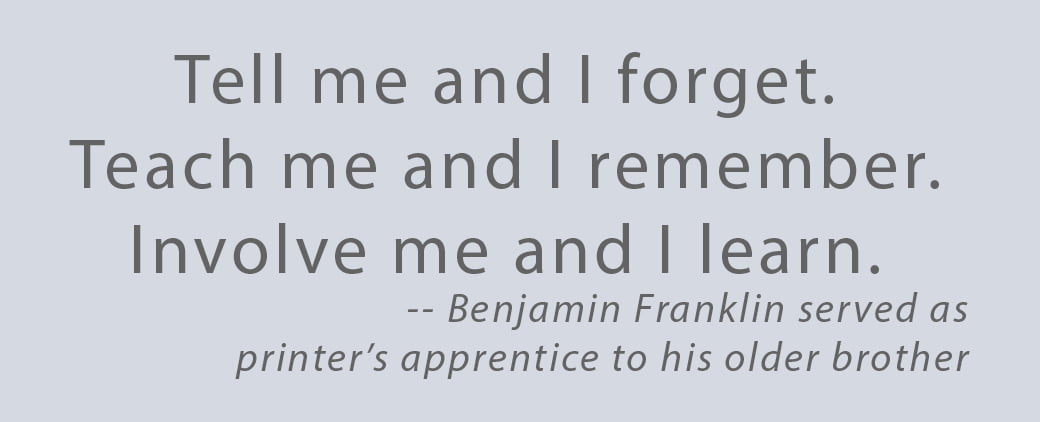
Bypassing College for a Professional Job
 dissatisfied with their economic circumstances, said Tom Bewick, founder of New Work Training Ltd. in London, which arranges employer apprenticeships. Bewick moderated the November panel for the Urban Institute in Washington.
dissatisfied with their economic circumstances, said Tom Bewick, founder of New Work Training Ltd. in London, which arranges employer apprenticeships. Bewick moderated the November panel for the Urban Institute in Washington.
“Our working and middle classes are in revolt against stagnating wages, a lack of affordable housing and distant institutional structures that come across as elitist,” he said. Apprenticeships aren’t a “silver bullet, but they are surely one of the practical responses to this set of challenges.”
And despite all the hype around getting a college education, not everyone is suited to college – nor are college degrees always the best preparation for the labor force. Graduates of apprenticeship programs supported by the U.S. Department of Labor are earning $60,000 per year, on average, said John Ladd, the program administrator. The Office of Apprenticeships that Ladd oversees has established 5,000 new programs in the past three years, he said.
In tight labor markets when it can be more difficult to find high-quality job applicants, U.S. employers might particularly benefit from apprenticeships, which give them additional time to get to get to know their trainees and to make better-informed hiring decisions. Apprenticeships also bring in “a higher class of applicants,” said panelist Robert Lerman, founder of the American Institute for Innovative Apprenticeship. Further, he said, both employers and employees are better off when workers train for the specific skills needed in individual work settings.
While U.S. apprenticeships are dominated by the building trades, according to Bewick, several panelists said the real need is in professional fields. In the fast-changing legal profession, apprenticeships work well for positions falling under the generic “paralegal” umbrella, said panelist Joyce Thorne, vice president of global human resources for Elevate Services, a U.K. legal services company. Two types of legal apprenticeships requiring non-legal skills are managers of legal matters within a law firm or corporation – say, someone to oversee a class-action pharmaceutical lawsuit – and people with project management skills to coordinate and complete legal projects.
Some employers prefer hiring apprentices over college graduates. The owner of a medical exercise training company who was in the audience was one such employer. “Our apprentices get 500 hours hands-on to understand the pathology of issues, patient background, expectations of doctors,” he said.
The apprenticeship program at Dartmouth Hitchcock Hospital in Lebanon, N.H., focuses on medical assistants. But the mathematics critical to being a pharmacy technician are also best learned on-the-job, said panelist Sarah Currier, director of workforce development for the hospital. “They don’t get this experience at a four-year school.”
David Willett from the U.K.’s Open University warned against employers making college vs an apprenticeship an either-or choice. His organization offers four-year degrees, with half of the learning in the classroom and half at an employer. To further integrate the two, tutors from academic settings come into workplaces to help their students apply what they learn in the classroom to real-world work problems.
“There is a growing recognition that learning by doing is a good thing and learning by doing while earning money and actually producing stuff is a cost-effective way to learn occupational skills,” Lerman said. Perhaps rock-bottom unemployment will persuade more U.S. employers to give them a try.
Squared Away writer Kim Blanton invites you to follow us on Twitter @SquaredAwayBC. To stay current on our Squared Away blog, please join our free email list. You’ll receive just one email each week – with links to the two new posts for that week – when you sign up here.
Comments are closed.







I think apprenticeships is an area we need the educational system here in the U.S. to better in. College will still remain important, but in many industries, hands on experience usually trumps the more broader education you get from many colleges.
I also think it’s good for all of us to challenge assumptions when possible, such as everyone should go to college, because it may lead to breakthroughs elsewhere.
Ultimately it’s up to the company to decide if apprenticeships are a value add for them or not. I think it is a function of the collective mindset of the executive management team to decide to be strategic and forward thinking, or hopeful and lucky.
I think Jim is right about the educational system. In my country, education is not so good and people are working when skipping the college education. I think college and high school must not be skipped, they are necessary for the quality educated people.
First of all, the article provides excellent information. Now coming to the point, apprenticeships should be implemented in companies so that unskilled people can learn how to get things done, but that’s just my opinion. Implementing apprenticeships or not depends on the company. College is still important and we should consider it seriously. Let’s see whether people will change or remain like as they are now. By the way, keep sharing such good quality articles mate!
Our head instructor at Stillwater Martial Arts is a perfect example of this article. He decided to bypass a specific education and spent his time learning in alternative ways. He is learning things that he wants to learn and it is much more affordable I might add!